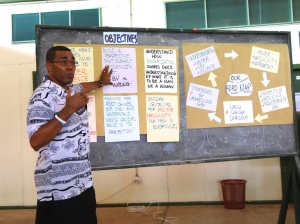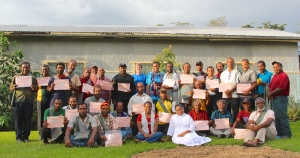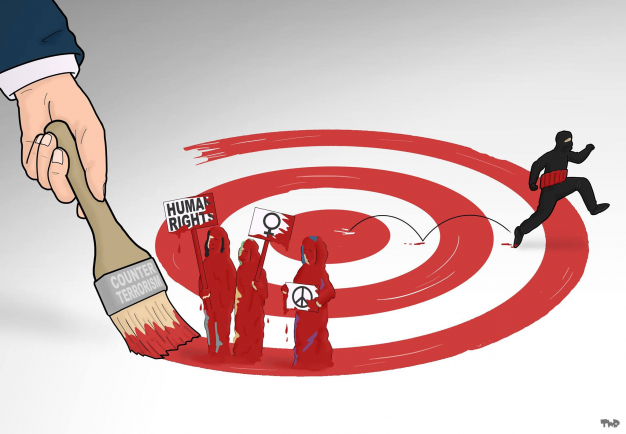Interview by WPP volunteer Laura Eggens
On the occasion fifth anniversary since WPP's pioneering 2009-2010 Training of Trainers Cycle "Overcoming Violence: Exploring Masculinities, Violence and Peace", WPP volunteer Laura Eggens interviewed ToT alumni Paulo Baleinakorodawa about his work for gender equality and redefining masculinities in the Pacific region. Since the ToT, Paulo has conducted extensive training and group facilitation on masculinities, addressing gender based violence and gender equality in the Pacific working intensively with both women and men. In this column, Paulo explains his dedication to a violence-free world and why it is important to get men on board. He elaborates on the need to open spaces for men to listen to women activists, highlighting the added value of facilitating a cross-gender dialogue within his trainings.
In 1996 I shifted from being a teacher to working with men in prisons in an overseas lay mission program in the Philippines. It was here that I discovered my newfound passion to help men deal with their violence. There are high incidences of violence against women in Fiji and the Pacific, so the work is very necessary. I have a lot of passion for this work, and get very excited when I witness that men can change their way of seeing the world, and understand their own violent behavior. I come from a part of the world where relationship is very important, which is why I bring a peacebuilding perspective to the work that focuses on addressing violence against women. We are not only dealing with affected women, we also look at men’s violence and see how that affects them. At the end of the day I want to see a violent free community, a violence-free family, a violence-free man, woman, nation… a violence-free world. That is my motivation. And I think that to achieve a violent free world, you need to work with men. Unfortunately men are still often the main decision makers, so that is where I want to see the change. I believe that it can be done. Violence is learned, and it can be unlearned.
WPP’s Training of Trainers in 2009-2010 changed my life completely. The training increased my confidence in working to help men change their violent behavior. Now I regularly include these topics in my trainings in the Pacific region. I would like to see the great and vibrant work done by the women’s movement around the world expanded even further in my region.
 At the end of January, 2015, I facilitated a ‘Redefining Masculinity for Gender Equality’-program in the Catholic Parish where I live in Fiji. We were fortunate to receive funding from the United Nations Development Program for that training. I trained 28 men in total, consisting of one youth and one adult male per ‘Area’ within this Catholic Parish. In Fiji, this type of work has not been done at this level before. I work with these men directly to help them understand gender equality, gender equity, gender discrimination, and violence against women. We discuss this at a personal level, but also analyze violent behavior from a wider power perspective and socialization processes.
At the end of January, 2015, I facilitated a ‘Redefining Masculinity for Gender Equality’-program in the Catholic Parish where I live in Fiji. We were fortunate to receive funding from the United Nations Development Program for that training. I trained 28 men in total, consisting of one youth and one adult male per ‘Area’ within this Catholic Parish. In Fiji, this type of work has not been done at this level before. I work with these men directly to help them understand gender equality, gender equity, gender discrimination, and violence against women. We discuss this at a personal level, but also analyze violent behavior from a wider power perspective and socialization processes.
Whatever work I do, I bring in my experience and knowledge – but also my values. I am Catholic, so in these trainings I start from a biblical perspective on human dignity. It sets the tone. Human dignity means that everyone is treated as equal. We talk about the key concepts of gender equality and violence against women. Then we discuss patriarchy, masculinity, power and violence. These discussions can become quite emotional, and I see clear moments when the men in the training start to understand these concepts on a personal level. This happens for instance during the ‘Men in the box’-exercise that we do. Men are asked to define the attributes that are associated with being a man, which often relate to violent behavior. Then I ask them, is there more to being a man? Can you still be a man when you move out of that box? In my parish for example, when we talk about different types of violence, men started to recognize their own behavior. One man got very emotional, because he suddenly understood the impact of his violent behavior on his wife. In our culture, men and boys are taught that crying in front of other men is not a sign of manliness. For this man to have done it openly in the training was a classic example of coming out of the ‘man’-box to be really human! Part of the training is for men to realize that they are just as human as women and girls, with emotions that need to be managed well. Men’s inability to manage their emotions, especially anger, ends up in women and girls being victimized. This is part of the change we want to see in men in these trainings.
It excites me when men in my trainings start to understand these kinds of things. I think it helps that my approach is very participatory. It also helps that I am a man myself, helping other men to change their violent behavior. I take an approach that will help men listen and move away from the entrenched norms of hegemonic masculinity. Because many of the communities are patriarchal, it is difficult for men to listen to women telling them what to do. To break through this I choose to also focus on masculinity and patriarchy and how that contributes to how men see the world, women, and other men. Unfortunately in our culture, men will not open up if women are present, particularly when talking about sensitive issues. This is why I dedicate part of my training to a cross-gender dialogue. After having discussed topics such as masculinity and patriarchy, women activists come to talk about violence from a women’s perspective. By then, the men are prepared to engage in the dialogue. Being the first ever cross-gender dialogue held in the parish, some defensiveness from men was to be expected. But careful facilitation of the dialogue helped men understand things from alternative perspectives. Towards the end of the dialogue, the men were more sympathetic towards the women and were ready to work as women’s allies in combating gender-based violence. Men and women together come up with brilliant ideas on what is practical and achievable on the ground. That gives me a lot of hope in this work!
It is new and challenging for men to work together with women. I saw through my own experience during the WPP ToT that it helped enormously to see things from both men’s and women’s perspectives. As I prepare for my trainings, I consult women who are working on the same topic to get their input and ideas. But of course I have to adapt it to suit a male audience. I think that the added female perspective also contributes to the success of my trainings.
Traditional masculine beliefs and values are very strong, and I notice even in the training that it is difficult for men to make a shift. I hope the time we spent together helps them think about changing their views and behaviors. The training offers men support in continuing this change when they go back to their communities. In the last part of my program, I ask them to write a letter to a significant woman – a wife, a mother, a sister. I also ask for 3-5 things they can commit themselves to – what can they change about their own behavior, and how can they transfer what they have learnt to their neighbors? They will now all run awareness sessions themselves in their community on violence against women, human dignity and gender equality. After two weeks we meet again to assess what they have done, and map the way forward together. Such assessments have produced many success stories.
 In this final phase of the training I also ask men to think about a male champion: a man who they know is a nonviolent man, and relates to men and women in a way that respects human dignity. They imagine this man writing a letter to them, but they write the letter themselves stating what changes they wish to see in their lives. I then mail those letters to them, a month or so after the training. It helps them to keep connected to the change process that they started. For many men, that anticipated change begins with a little step. But for that change to continue, they do need some form of support. It is a risk that men go back to old behavior. This is why it is critical to continue to provide on-going support to men in their change process and to have people on the ground who have time to keep discussing these issues with men. In the training in my parish I already saw some men with potential to become trainers and become part of such a support structure where men can come back to reflect on their worldviews and their own development. Hopefully, they can contribute to a movement for gender equality I am trying to develop: Men Opposing Violence Everywhere (MOVE) Fiji. I am positive that if we continue working with men and expanding the group of male trainers, in close connection with women activists, it will have a significant impact on the relationship between men and women in the Pacific.
In this final phase of the training I also ask men to think about a male champion: a man who they know is a nonviolent man, and relates to men and women in a way that respects human dignity. They imagine this man writing a letter to them, but they write the letter themselves stating what changes they wish to see in their lives. I then mail those letters to them, a month or so after the training. It helps them to keep connected to the change process that they started. For many men, that anticipated change begins with a little step. But for that change to continue, they do need some form of support. It is a risk that men go back to old behavior. This is why it is critical to continue to provide on-going support to men in their change process and to have people on the ground who have time to keep discussing these issues with men. In the training in my parish I already saw some men with potential to become trainers and become part of such a support structure where men can come back to reflect on their worldviews and their own development. Hopefully, they can contribute to a movement for gender equality I am trying to develop: Men Opposing Violence Everywhere (MOVE) Fiji. I am positive that if we continue working with men and expanding the group of male trainers, in close connection with women activists, it will have a significant impact on the relationship between men and women in the Pacific.
Paulo Baleinakorodawa participated in WPP’s Training of Trainers on Masculinities in 2009-2010. He is a former teacher, and used his professional training around restorative justice, conflict resolution and peacebuilding to work with imprisoned men in Fiji. Since establishing the Pacific Center for Peacebuilding with colleagues in 2009, he has been working with men on nonviolence and gender equality in the Pacific region. Since 2011, he has been working as an independent consultant.
11 Dec '17 This month WPP staff interviewed Arbia Jebali and Sarah Chamekh from Free Sight Association in Tunisia about the work their organization does, how civil society space has changed over the years, which challenges they are facing now, and how civil society in Tunisia is organizing itself to overcome those challenges.
7 Nov '17 In this article, WPP staff interviewed Doron Joles of XminY Fund, an activist organization that supports social movements, action groups and changemakers fighting for a fair, democratic, sustainable and accepting world. He discusses the unique way they have chosen to hand out funds, and the challenges that go along with funding small activist organizations in the current global climate.

25 Oct '17 This Friday, the UNSCR 1325 Open Debate will take place once again, seventeen years since the adoption of landmark UN Security Council Resolution 1325 on Women, Peace and Security. In this article WPP staff reflects on the progress made for a truly transformative feminist peace agenda until now.
